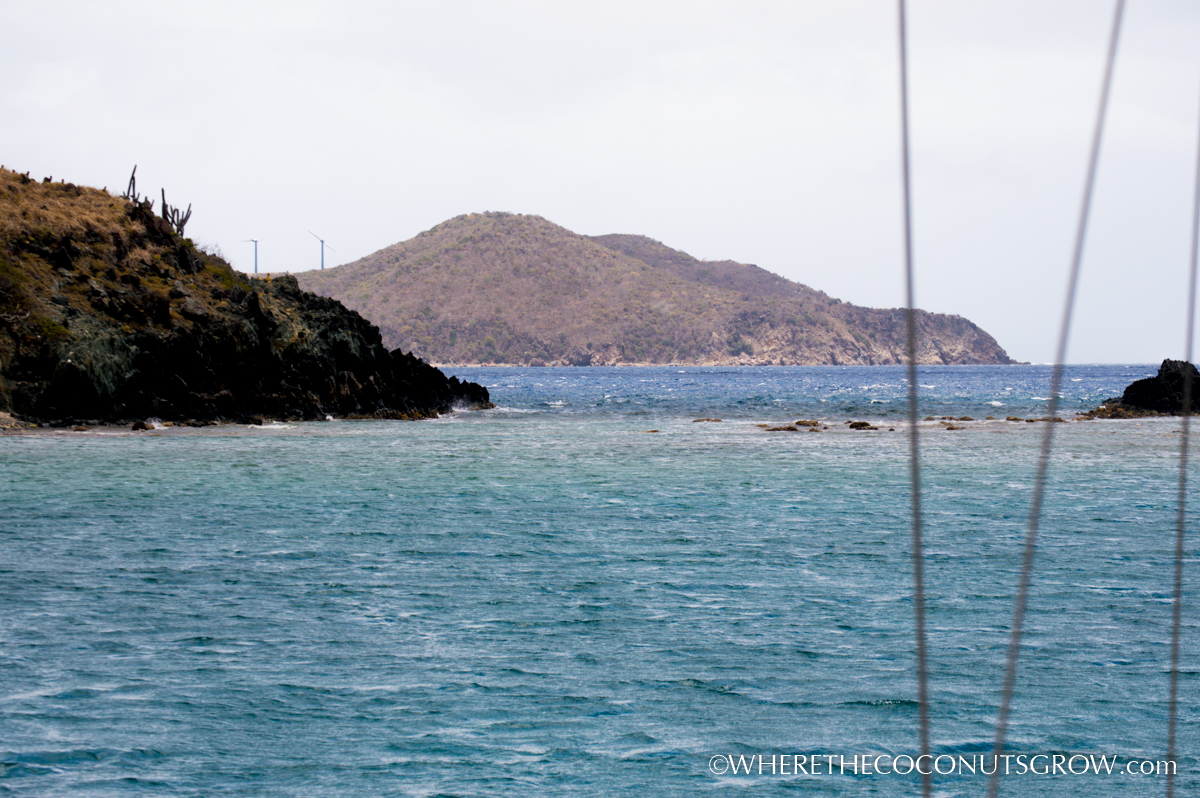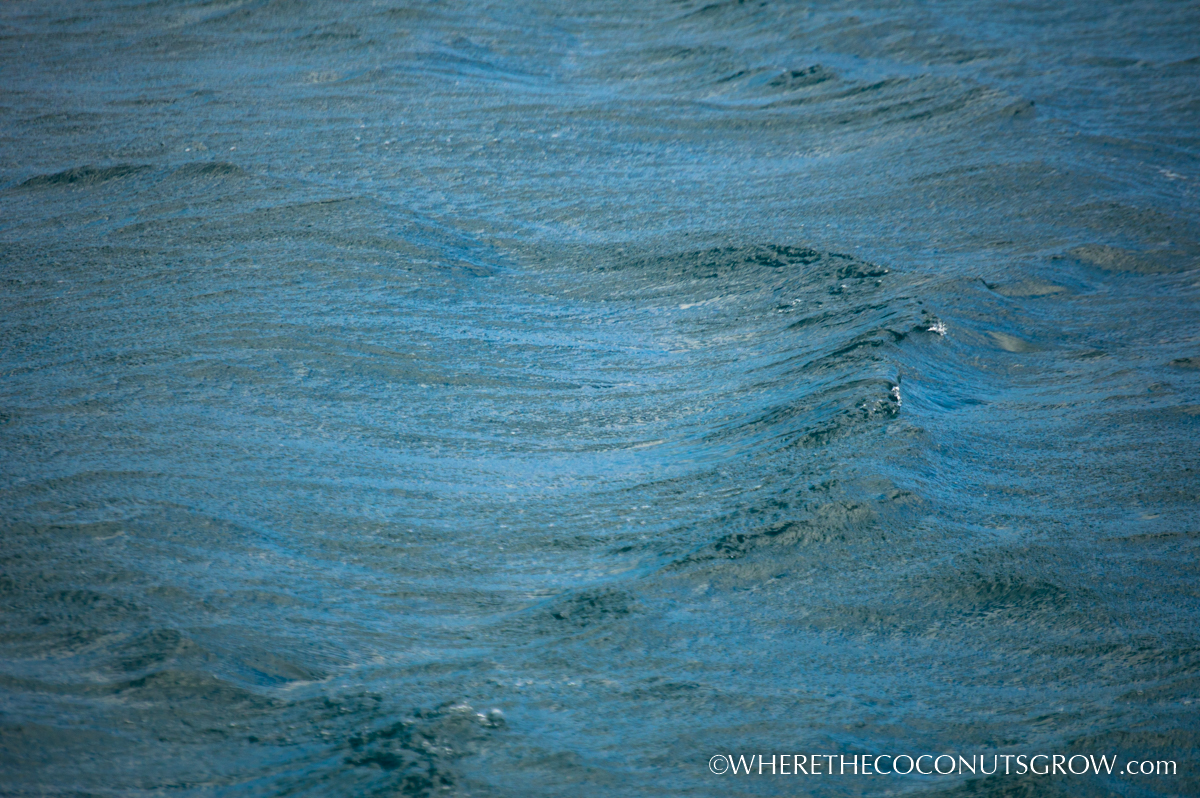On land, I used to come home from work, walk inside my cozy house, and close the door behind me shutting out the entire outside world. It didn’t matter if it was raining cats and dogs or sizzling the pavement with that hot Californian sun. My climate-controlled cozy house was completely isolated.
Living in a tiny floating home has since got me tuning in to my senses on a daily basis in a way I never even imagined. I rely on my five senses to keep me safe, to keep me comfortable, and to bring me joy in the simplest of forms.
SIGHT:
Sight wins my vote for the most important sense to have living in a tiny floating home. The oceans are big, though we are most often navigating through anchorages near shore where there are many hazards and other boats to be aware of. We verify water depth by sight whenever possible. When fishing, we are constantly scanning the water’s surface for fish feeding, birds working, ocean currents and other marine life such as seaweed and kelp where fish congregate.
The changing patterns in the clouds alert us to approaching weather systems. Ripples on the water can tell us which direction the wind is blowing and how much the wind is blowing. If we see only ripples inside a protected anchorage yet we see white caps outside, it’s a good indication the sea state is not settled. Rustling palm trees and billowing flags can also tell us the direction and strength of the wind.
Over the last month, the hazy color of the sky tells us that there is a layer of Saharan Dust in the sky that has blown over to the Caribbean from Africa. This signifies a smaller percentage chance of rain in the near future.
Almost every evening I get to sit back from the comfort of my own home and enjoy the most beautiful sunsets on the horizon, no matter where we are in the world. The adventures we take open our eyes to many wonders of the world that most people will never experience. I do my best to photograph what I can of the beauty I see, though sometimes photos just don’t do full justice. I’m grateful to be able to see these things with my own eyes.

HEARING:
This is probably the sense I appreciate the most living on a boat. Though I may not be able to see every system of the boat in plain sight, I can always rely on my sense of hearing to tell me when something isn’t quite right. If our water pump cycles when we are not using the water, this can tell us there may be a leak somewhere and we are losing our precious supply of fresh water.
The rumbling of the diesel engine makes a distinct sound when at idle and when engaged. If it’s idling too low, I know by sound alone that I need to bump up the throttle to make the engine run better.
A few weeks ago we heard a loud and unusual thud near the bow of the boat. Immediately we flew outside to see what the noise was caused by and we found that another boat had drug into us and got itself caught on our anchor chain.
When the wind picks up, our wind generator makes a different sound the faster it spins. If I were not subconsciously tuned in to my hearing at all times, I may have not woken up in time to be able to save our boat from sinking when a ferry drug anchor and came for us in the middle of a squall.
The crickets and frogs don’t chirp on shore if it’s stormy enough to rain. Birds seem to only sing when it’s sunny.
I notice the most subtle change in the way the waves lap against the hull when a dinghy approaches our boat. I know the sound our dinghy motor makes in comparison to all of our neighbors in the anchorage.
As fine tuned as my hearing has become, the dogs hear exponentially more than me and they will always alert me when someone is coming near the boat. It’s a tremendous relief to know they add so much security to our floating home.

Smelling:
Smells are definitely enhanced inside a tiny home. There’s just not much space for air to flow to which makes it easy to catch a whiff of something potentially unwanted.
I know it has recently rained when I can smell the island. I can smell sweet flowers. I can smell the earth after it has rained.
A burning smell can warn us of unintentional flames. If the propane tank is leaking, we can usually smell it right away. When visiting other boats, we can tell if it’s been a long time since the sanitation hoses were changed or when their holding tank is full. If you have cats, we can smell the kitty litter just by being down-wind of you!! If the drains are clogged, we can smell funky rotting food usually before the drain fails.

Touch:
In addition to hearing the rumble of the diesel engines, we can also feel when they are not idling properly. We can feel the vibration of the wind generator shaking the mast as the wind picks up. We can feel the harmonics vibrating through the rigging when the wind blows. We feel the gentle waves rocking us to sleep at night. We also feel the huge ferry wakes tipping our boat back and forth when things are flying off the countertops.
After just a short time on the boat, it has become second nature to notice the slightest change in temperature when swept in with an increase in breeze. Just one cool gust gently kissing my cheek tells me to look up to the sky and see if rain is on the way. 9 times out of 10 there are clouds approaching. It almost feels like that scene in Twister where he walks out across the road, closes his eyes and feels the weather changing.

Taste:
It’s not uncommon for us to taste the difference between salt water and fresh water. Just this evening we were riding in the dinghy in the dark back to our boat and we couldn’t see how big the waves were in front of us. We also knew rain clouds were coming. After feeling a light misting on our faces, we quickly licked our lips to see if it was salt spray from the waves, or if it had just started to drizzle. This of course would tell us if we were salty enough for a second shower when we got home!
Another time we might need to taste the water is if we find an unwanted leak. It may seem kind of gross, but it’s often important to know if salt water is leaking into the boat from somewhere, or if its only fresh water. Fresh water will dry up eventually and is not as critical. Salt on the other hand will corrode things quickly so it’s best to eliminate the leak immediately.
Finally, we taste our sample water every day when we turn on the watermaker. We let it run for a few minutes then taste it to make sure the membranes are still functioning properly and are efficiently converting salt water into fresh water before we begin filling our tanks.
Inside this tiny floating home, I am only a short distance away from immense power of Mother Nature. The ocean is a very powerful thing and I lay inches from it every night. Huge creatures swim right past my head and I don’t even know it at the time. My safety, comfort and happiness are dependent on my ability to tune in to my senses and be connected with my surroundings to the very best of my ability. It wasn’t until I began living on a boat that I truly learned the importance of tuning in, and for that I am grateful.
How much do you rely on your senses?
By Jody Pountain for the [Tiny House Blog]

I too live in a floating home, but it’s not a boat. It’s a floating cabin. And it’s on fresh water and is permanently anchored to shore on a large lake in Coastal BC. Senses are very important for us as well. They protect us, especially during the winter storm months. But they also let us enjoy the quiet of nature and our home’s surroundings. – Margy
A floating cabin, I would love to see photos! Sounds wonderful Margy 🙂